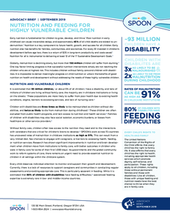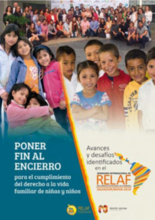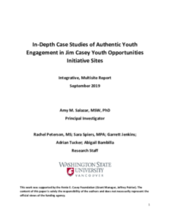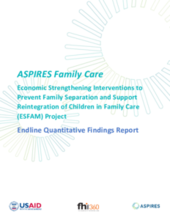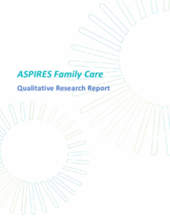Demographic Data
|
Sources: World Bank, UNDP, UNAIDS, DHS 2013 |
Displaying 5721 - 5730 of 14395
This report presents a Child Multidimensional Poverty Index (Child MPI) for Thailand.
This advocacy brief from SPOON Foundation notes that successful nutrition interventions are not reaching the children who are at highest risk, including children without family care and children with disabilities, and outlines four key actions that can help to ensure that children without family care and children with disabilities have opportunities to grow and thrive.
Este informe de RELAF resume las presentaciones y discusiones del Seminario Internacional 2019 de RELAF.
This report from RELAF summarizes the presentations and discussions from RELAF's 2019 International Seminar, "For the right to family and community life. Putting an end to the confinement of children deprived of parental care."
This paper examines the data of empirical research on child-parent relationship in the Russian adoptive and birth families.
The purpose of this study is to synthesize and share the Jim Casey Youth Opportunities Initiative’s approach to youth engagement. The study’s findings communicate how authentically engaging youth can help both the Jim Casey Initiative and youth-serving systems achieve their desired results.
The Accelerating Strategies for Practical Innovation and Research in Economic Strengthening (ASPIRES) Family Care Project focused on how economic strengthening (ES) interventions can help prevent unnecessary separation of children from families as well as support the reintegration into family care of children who were already separated. This mixed methods evaluation was implemented alongside programming that included longitudinal quantitative data collection with all participating FARE and ESFAM households at three time points to assess a range of indicators related to household economic and family well-being, as well as in-depth, longitudinal qualitative research to help understand how (well), from participants’ perspectives, the FARE and ESFAM interventions aligned with perceived drivers of separation and families’ experienced child-level effects of programming.
The Economic Strengthening to Keep and Reintegrate Children in Family Care (ESFAM) project was developed to help build the evidence base on how to appropriately match economic strengthening (ES) activities with families at risk of family-child separation and with families in the process of reintegrating a previously separated child. In addition to supporting families, ESFAM offered an opportunity for learning about how to provide these services and how well they worked. This report focuses on the latter and summarizes changes in key indicators related to family-child separation over the course of the project.
The Family Resilience (FARE) project was developed to help build the evidence base on how to appropriately match economic strengthening (ES) activities with families at risk of family-child separation and with families in the process of reintegrating a previously separated child. The project offered an opportunity for learning about how to provide ES and other family strengthening services and how well they worked. This report focuses on the latter and summarizes changes in key indicators related to family-child separation over the course of the project.
In support of the Accelerating Strategies for Practical Innovation & Research in Economic Strengthening (ASPIRES) project's objective to assess the effects of different types of economic strengthening activities integrated with family support activities among targeted families, the Family Care project designed a mixed methods evaluation to be implemented alongside programming. The findings presented in this report are derived from the longitudinal descriptive data generated as part of the evaluation design.


